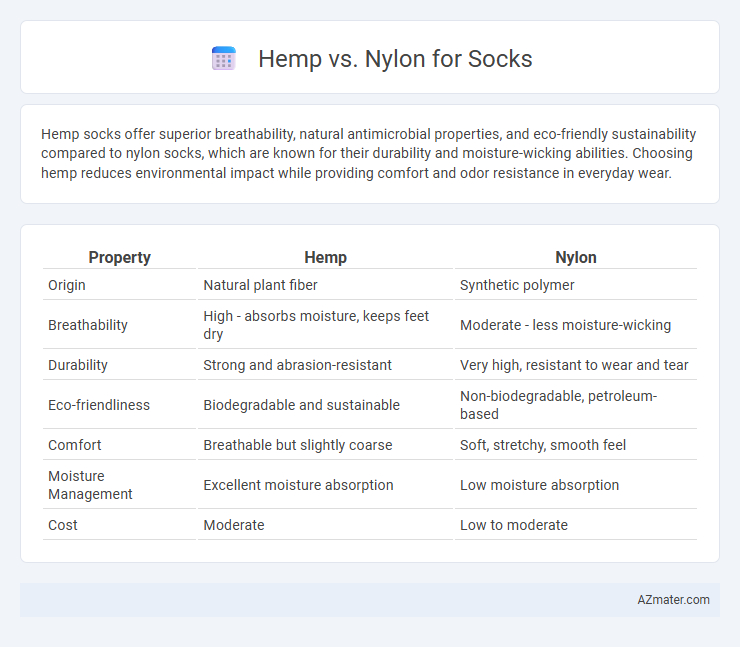Hemp socks offer superior breathability, natural antimicrobial properties, and eco-friendly sustainability compared to nylon socks, which are known for their durability and moisture-wicking abilities. Choosing hemp reduces environmental impact while providing comfort and odor resistance in everyday wear.
Table of Comparison
| Property | Hemp | Nylon |
|---|---|---|
| Origin | Natural plant fiber | Synthetic polymer |
| Breathability | High - absorbs moisture, keeps feet dry | Moderate - less moisture-wicking |
| Durability | Strong and abrasion-resistant | Very high, resistant to wear and tear |
| Eco-friendliness | Biodegradable and sustainable | Non-biodegradable, petroleum-based |
| Comfort | Breathable but slightly coarse | Soft, stretchy, smooth feel |
| Moisture Management | Excellent moisture absorption | Low moisture absorption |
| Cost | Moderate | Low to moderate |
Introduction to Hemp and Nylon Socks
Hemp socks offer natural breathability, moisture-wicking properties, and antimicrobial benefits, making them an eco-friendly alternative to traditional fibers. Nylon socks provide superior elasticity, durability, and abrasion resistance, ideal for high-performance and long-lasting wear. Choosing between hemp and nylon socks depends on preferences for sustainability, comfort, and durability in daily or athletic use.
Material Origins: Hemp vs Nylon
Hemp fibers are derived from the stalks of the Cannabis sativa plant, making them a natural, biodegradable, and renewable resource ideal for eco-friendly socks. Nylon, a synthetic polymer created through chemical processes involving petroleum, offers durability and elasticity but lacks the environmental benefits of hemp. Choosing hemp over nylon supports sustainable agriculture and reduces reliance on fossil fuels, promoting eco-conscious footwear options.
Environmental Impact Comparison
Hemp socks boast a significantly lower environmental impact than nylon due to hemp's rapid growth, minimal pesticide use, and biodegradability, which reduces textile waste. Nylon production relies heavily on fossil fuels, releasing substantial greenhouse gases and microplastics that pollute ecosystems. Choosing hemp socks supports sustainable agriculture and decreases reliance on non-renewable resources, making them an eco-friendlier footwear option.
Durability and Longevity
Hemp socks offer exceptional durability due to their strong, natural fibers that resist wear and tear better than many synthetic alternatives. Nylon socks provide excellent elasticity and abrasion resistance, but tend to degrade faster with repeated washing and heavy use. Choosing hemp over nylon enhances sock longevity by combining natural strength with moisture-wicking properties, resulting in longer-lasting comfort and performance.
Comfort and Breathability
Hemp fibers offer superior breathability and moisture-wicking properties, making hemp socks exceptionally comfortable for extended wear. Nylon, while durable and elastic, lacks the natural ventilation of hemp, often leading to reduced airflow and increased sweat retention. Choosing hemp socks enhances foot comfort by maintaining dryness and preventing overheating throughout the day.
Moisture-Wicking Abilities
Hemp fibers naturally exhibit superior moisture-wicking properties due to their breathability and ability to absorb and release moisture quickly, making hemp socks ideal for keeping feet dry and comfortable. Nylon, while durable and often blended with other fibers to enhance sock strength, lacks the same moisture absorption and ventilation capabilities, which can lead to increased sweat retention and reduced breathability. Choosing hemp socks over nylon helps manage foot moisture efficiently, reducing odor and the risk of fungal infections during extended wear.
Odor Resistance and Hygiene
Hemp fibers naturally possess strong antimicrobial properties that inhibit bacterial growth, enhancing odor resistance and maintaining foot hygiene better than nylon. Nylon, though durable and moisture-wicking, tends to retain odors due to its synthetic structure, which can harbor bacteria more easily. Choosing hemp for socks supports better breathability and freshness, reducing unpleasant smells and promoting overall foot health.
Style and Color Options
Hemp socks offer a natural, earthy aesthetic with muted, organic tones that appeal to eco-conscious consumers seeking sustainable fashion. Nylon socks provide a broader spectrum of vibrant colors and sleek finishes, making them ideal for bold, modern style statements. The choice between hemp and nylon socks depends on preferences for eco-friendly, understated looks versus versatile, vivid color options.
Cost and Accessibility
Hemp socks generally offer a more cost-effective and eco-friendly option compared to nylon, as hemp fibers are renewable and require less energy-intensive processing. Nylon socks, however, tend to be more widely accessible due to the material's dominance in the textile industry and established manufacturing infrastructure. Despite higher expense, hemp socks appeal to eco-conscious consumers seeking sustainable alternatives with antimicrobial and moisture-wicking properties.
Which Sock Material Is Right for You?
Hemp socks offer natural breathability, exceptional durability, and antimicrobial properties, making them ideal for sensitive skin and eco-conscious consumers. Nylon socks provide superior elasticity, moisture-wicking capabilities, and lightweight comfort, suited for athletic activities and long hours of wear. Choosing between hemp and nylon socks depends on whether you prioritize sustainable fabric benefits or enhanced performance features.

Infographic: Hemp vs Nylon for Sock
 azmater.com
azmater.com